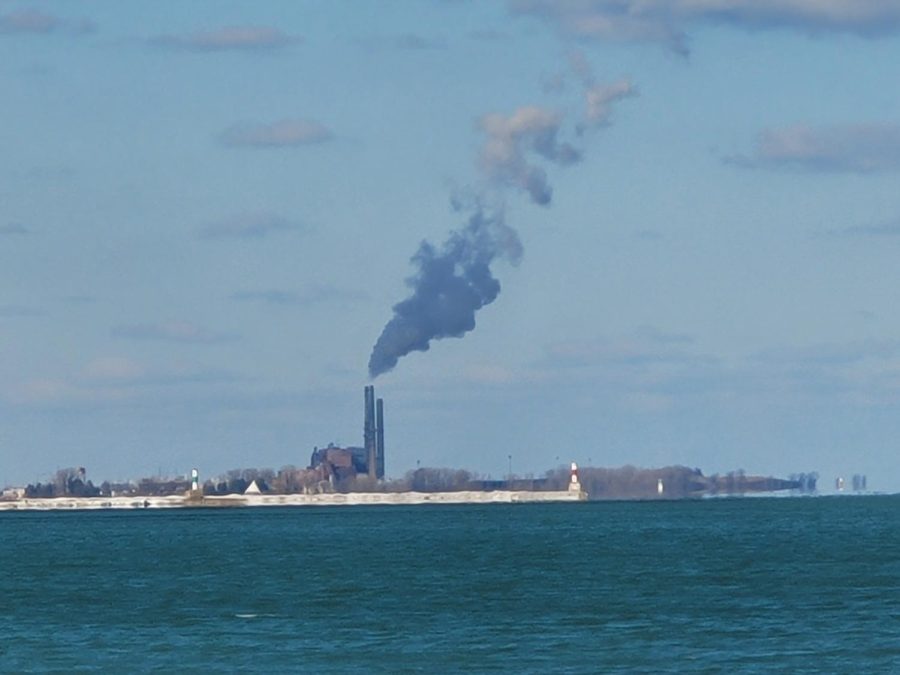Coal-Fired Waukegan Generating Station shutting down next month
The Waukegan Generating Station sits on the shore of Lake Michigan, with toxic particulate matter rising from the coal-fired generators. The plant has a capacity of 803 Megawatts; however, the station only runs in times of high electrical grid demand.
The nearly century-long lifespan of Lake County’s remaining coal-fired power plant will be ending next month in June 2022. Located in Waukegan on the shores of Lake Michigan, this power plant has been burning coal since 1923. The plant has gone through many updates to try to make it economically viable and more environmentally friendly, but ultimately both of these goals have failed.
NRG, the owner of the plant, announced that the Waukegan power plant will close as a result of poor financial results according to the May 2021 NRG report.
Environmental Impact
For years, the plant has been at the forefront of many environmental justice issues, specifically involving the amount of air pollution that Waukegan – a primarily black and brown community – was exposed to.
Currently, many areas in Lake County are exposed to levels of particulate matter that is not widely considered “safe” according to national standards. These places include, but are not limited to Waukegan High School, North Chicago High School, Illinois Beach State Park and Lake Forest College. These places are in violation of the EPA’s one hour sulfur dioxide (SO2), which is 75 parts per billion (ppb).
This dangerous exposure to sulfur dioxide and other pollutants emitted from coal plants like the Waukegan Generating Station has a significant negative impact on human health. When inhaled at high levels, these emissions can cause irritation of the throat and lungs, leading to difficulty breathing, increased asthma symptoms, more respiratory illnesses and cardiovascular disease according to the Illinois Sierra Club.
These negative impacts have materialized in the bodies of Lake County residents according to a 2010 report from the Clean Air Task Force. Annually, particulate matter from the Waukegan Generating Station has caused 570 asthma attacks, 34 premature deaths, 54 heart attacks, 21 incidences of chronic bronchitis and 35 asthma ER visits.
In 2012, the NAACP, an organization to advance justice for African Americans, released its “Coal Blooded” report which found that low-income and minority communities are disproportionately affected by pollution from coal plants. The report ranked the Waukegan Generating Station as the twelfth worst violator of environmental justice in the country, and gives the plant an “F” ranking.
Leah Hartung, a member of Clean Power Lake County (CPLC) explained that, “Waukegan just has a really long history of environmental degradation and environmental pollution. There’s a lot of toxic pollution that has just always been in Waukegan.” Hartung works on the steering committee for CPLC and is a senior at Emory University, along with being an LHS graduate.
Because the plant is located adjacent to Lake Michigan, it threatens one of the most important freshwater sources in the United States.
“There’s two coal ash ponds that are right next to the coal plant, which are a stone’s throw away from Lake Michigan. [This is where] we get our drinking water,” Hartung said. “Coal ash ponds have been found to be leaking into our groundwater with unsafe levels of different chemicals.
What’s Next
Just because the coal plant is shutting down, however, that doesn’t mean that the long-lasting environmental effects of the plant will be immediately resolved. This is why organizations like CPLC were created.
“Clean Power Lake County was created in 2013 to provide a just transition for the Waukegan coal plant,” Hartung explained. “We want to make sure that this place is actually cleaned up, that we get remediation, that workers get retraining and we get tax base replacement.”
“It’s really historic in that way that there’s been so much community involvement,” Hartung recounted.
This is confirmed by a 2016 study conducted by the Illinois Sierra Club, which states that 70 percent of Waukegan voters support the transition plan to retire the power plant. Waukegan voters also strongly prefer an expansion of solar power and a reduction in the use of coal across the board. Plans have been developing for community solar in Waukegan, and even in areas that have been designated as being too polluted for any use.
Hartung explained that coal plants in general have no place in the future of Lake County and the world.
“The economics of it don’t make sense [for operators]. If we don’t transition to renewable energy then we’re not going to have a planet,” she emphasized. “Coal is just really dirty. It’s not as efficient and it’s on its way out. It’s on its way out everywhere.”





![Wildcats do their pre -race circle that consists of chants and cheers to hype up the team. “I think cross country is such an interesting sport, in the way we're all kind of struggling together at the same time," senior Emme Fogle said. "[We have] comfort knowing that everyone's kind of going through the same thing. It's kind of incredible.”](https://www.lhsdoi.com/wp-content/uploads/2025/09/Screenshot-2025-09-25-3.14.42-PM-600x361.png)




